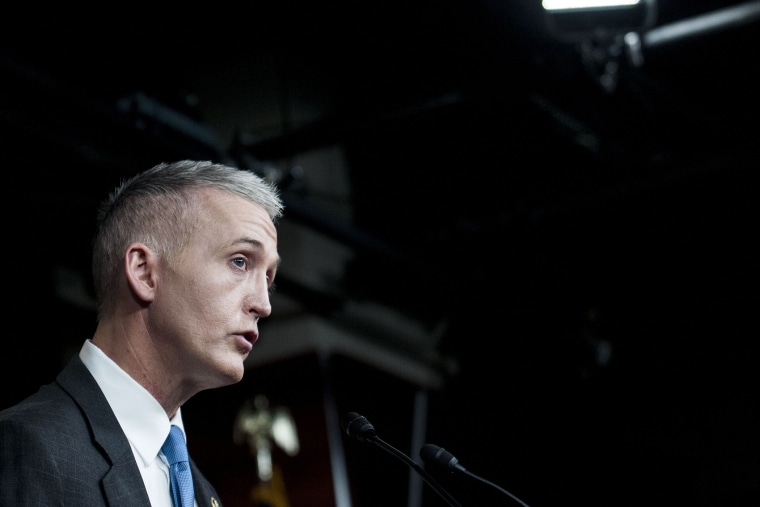As you're probably aware, there's a bit of a collision happening right now between Rubio and fellow 2016 candidate Ted Cruz as the two have risen in national and state polling. Cruz has been whacking Rubio for his support for comprehensive immigration reform, and Rubio has hit back by arguing that Cruz had "weakened" national security by voting for the USA Freedom Act, which reformed intelligence gathering procedures and ended the government's bulk data collection of phone records. In Rubio's estimation, the legislation jeopardizes the safety of the American people. "I know this, if God forbid there's an attack tomorrow morning in another major U.S. city, the first question everyone is going to have is: Why didn't we know about them, and how come we didn't stop it?" he said on Fox News earlier this month. "And the answer better not be: Because a tool we once had that could have allowed us to identify them is no longer available to us."
A key point of contention between Gowdy and Rubio
As far as Marco Rubio is concerned, his new pal "weakened" national security and "harmed our intelligence programs" at a critical time.

Marco Rubio's presidential campaign picked up another congressional endorsement this week, though this one was a little higher profile than most: Rep. Trey Gowdy (R-S.C.), best known for his chairmanship of the Republicans' Benghazi committee, threw his support behind the Florida senator. In fact, Gowdy even traveled to Iowa to campaign on Rubio's behalf.
The announcement, which came as something of surprise -- the congressman avoided 2016 politics for months -- sparked two areas of discussion. The first focused on the GOP's Beltway establishment continuing to look at Rubio as the party's least bad choice for next year's presidential race. Especially given the importance of South Carolina's primary, Gowdy's support was sought after by much of the Republican field.
The other discussion, pushed by Donald Trump, emphasized the abject failure of Gowdy's debacle of a committee.
But Salon's Simon Maloy flagged an under-appreciated angle to all of this: "[A] Gowdy-Rubio campaign tag team is actually kind of awkward for Rubio, given the extent to which their records clash."
Gowdy not only joined Ted Cruz in voting for the USA Freedom Act, the South Carolina Republican was one of the bill's original co-sponsors.
In other words, as far as Marco Rubio is concerned, his new pal "weakened" national security and "harmed our intelligence programs" at a critical time.
Indeed, as we discussed a couple of months ago, Rubio doesn't seem to appreciate the risk he took by making criticism of the USA Freedom Act a key part of his message. Cruz was hardly the only one voting for it -- the bill passed the Senate with a 67-vote majority, and passed the GOP-led House, 338 to 88. It was backed by members of the Republican leadership in both chambers, including House Speaker Paul Ryan.
More to the point, some of the congressional Republicans who've endorsed Rubio's campaign also voted with Cruz -- and against Rubio -- on the reform law.
Is the Florida senator prepared to explain why his allies from his own party aren't trustworthy on matters of national security?